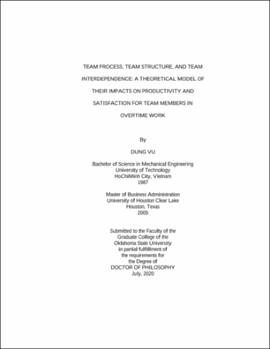| dc.contributor.advisor | Aime, Federico | |
| dc.contributor.author | Vu, Dung | |
| dc.date.accessioned | 2021-02-22T22:24:20Z | |
| dc.date.available | 2021-02-22T22:24:20Z | |
| dc.date.issued | 2020-07 | |
| dc.identifier.uri | https://hdl.handle.net/11244/328632 | |
| dc.description.abstract | As global markets become increasingly competitive and dynamic, employers and employees face challenges related to work overload, the most common of which is overtime work. While much research has been carried out on the topic, previous analyses of the effects of overtime work have paid little attention to the behavior of team members and their productivity and satisfaction. Furthermore, little is known about process loss and process fain in overtime teams and the possible moderating effects of hierarchical leadership and interdependence. Thus, this project set out to investigate: one, the impacts of overtime work on the productivity and satisfaction of individual team members; two, how teams deal with overtime requirements through process loss and process gain; three, how different team structures may influence the relationship between overtime work and process loss/gain; and four, the effects of interdependence on the relationship between process loss/gain and productivity and satisfaction of team members. A model of such relationships is proposed. Two experimental design studies were developed for this project. Study 1 used archival data and survey questionnaire responses to collect data from 135 employees of an international engineering firm who worked overtime for a period of two months. Study 2, which used survey questionnaires, was conducted with employees from another 104 service industry firms who had worked overtime in the past. The data was analyzed using a variety of descriptive and inferential statistics, including multilevel structuring equation modeling and item parcel confirmatory factor analysis modeling. The results suggest that, in general, overtime is not associated with absenteeism, creativity, or promotion opportunity and is inconsistent with fatigue/stress and conflict. The findings, however, underscore the importance of teamwork and centralization with regards to the productivity and satisfaction of employees. Teamwork was the only variable found to be significantly fully mediating the relationship between overtime and employee well-being and, unlike what had been hypothesized, it was centralization rather than self-management that was found to positively moderate the relationship between overtime and process loss or process gain. These findings make an important contribution to the field both theoretically and practically with serious implications for organizations for better performance. | |
| dc.format | application/pdf | |
| dc.language | en_US | |
| dc.rights | Copyright is held by the author who has granted the Oklahoma State University Library the non-exclusive right to share this material in its institutional repository. Contact Digital Library Services at lib-dls@okstate.edu or 405-744-9161 for the permission policy on the use, reproduction or distribution of this material. | |
| dc.title | Team process, team structure, and team interdependence: A theoretical model of their impacts on productivity and satisfaction for team members in overtime work | |
| dc.contributor.committeeMember | Dimotakis, Nikos | |
| dc.contributor.committeeMember | Wang, Cynthia | |
| dc.contributor.committeeMember | Flaherty, Karen | |
| osu.filename | Vu_okstate_0664D_16812.pdf | |
| osu.accesstype | Open Access | |
| dc.type.genre | Dissertation | |
| dc.type.material | Text | |
| dc.subject.keywords | centralized team | |
| dc.subject.keywords | interdependence | |
| dc.subject.keywords | overtime | |
| dc.subject.keywords | self-management team | |
| dc.subject.keywords | teamwork | |
| thesis.degree.discipline | Business Administration | |
| thesis.degree.grantor | Oklahoma State University | |
